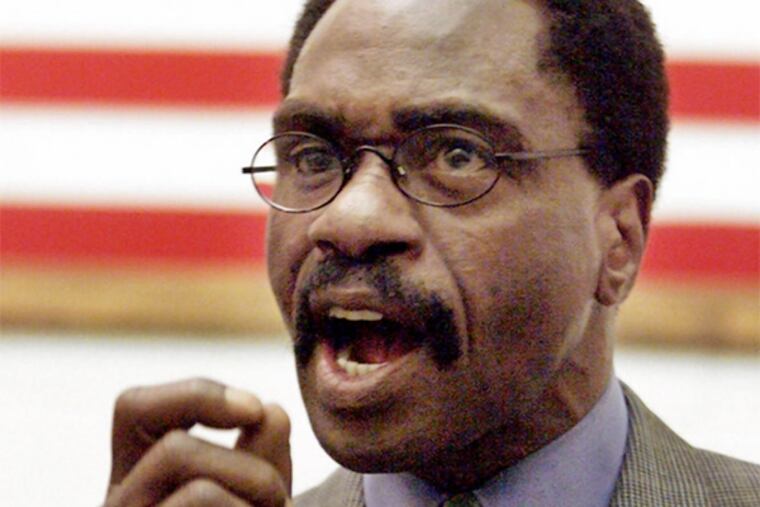Boxer Rubin 'Hurricane' Carter dead at 76
Rubin "Hurricane" Carter, 76, the boxer whose wrongful murder conviction became an international symbol of racial injustice, died Sunday. He had been stricken with prostate cancer in Toronto, his adopted home. John Artis, a longtime friend and caregiver, told the Canadian Press Mr. Carter died in his sleep.

Rubin "Hurricane" Carter, 76, the boxer whose wrongful murder conviction became an international symbol of racial injustice, died Sunday.
He had been stricken with prostate cancer in Toronto, his adopted home. John Artis, a longtime friend and caregiver, told the Canadian Press Mr. Carter died in his sleep.
Mr. Carter, a native of New Jersey, spent 19 years in prison for three murders at a tavern in Paterson in 1966. He was convicted with Artis in 1967 and again at a new trial in 1976. He was freed in November 1985, when his convictions were set aside after years of appeals.
Mr. Carter's ordeal and the alleged racial motivations behind it were publicized in Bob Dylan's 1975 song "Hurricane," several books, and a 1999 film starring Denzel Washington, who received an Academy Award nomination for playing the boxer turned prisoner.
Although never a world champion, Mr. Carter went 27-12-1, with 19 knockouts, memorably stopping two-division champ Emile Griffith in the first round in 1963. He also fought for a middleweight title in 1964, losing to Joey Giardello.
In June 1966, three white people were shot by two black men at the Lafayette Bar & Grill in Paterson. Mr. Carter and Artis were convicted by an all-white jury largely on the testimony of two thieves who later recanted.
Mr. Carter was granted a new trial and briefly freed in 1976, but he was sent back for nine more years after being convicted at a second trial.
Thom Kidrin, who became friends with Mr. Carter after visiting him several times in prison, told the Associated Press the boxer "didn't have any bitterness or anger - he kind of got above it all. That was his great strength."
"I wouldn't give up," Mr. Carter said in an interview on PBS in 2011. "No matter that they sentenced me to three life terms in prison. I wouldn't give up. Just because a jury of 12 misinformed people . . . found me guilty did not make me guilty. And because I was not guilty, I refused to act like a guilty person."
Dylan became aware of Mr. Carter's plight after reading the boxer's autobiography. He performed "Hurricane" on his Rolling Thunder Revue tour in 1975.
Muhammad Ali spoke out on Mr. Carter's behalf. Advertising art director George Lois and other celebrities also worked for his release.
With a network of friends and volunteers also advocating for him, Mr. Carter eventually won his freedom from U.S. District Judge H. Lee Sarokin, who wrote that Mr. Carter's prosecution had been "predicated upon an appeal to racism rather than reason, and concealment rather than disclosure."
Born May 6, 1937, into a family of seven children, Mr. Carter struggled with a hereditary speech impediment and was sent to a juvenile reform center at 12 after an assault. He escaped and joined the Army in 1954, experiencing racial segregation and learning to box while in West Germany.
He committed a series of muggings after returning home and spent four years in various state prisons. He began his pro boxing career in 1961 after his release, winning 20 of his first 24 fights, mostly by stoppage.
He boxed regularly on television at Madison Square Garden and in London, Paris, and Johannesburg. Although his career appeared to be on a downswing before he was implicated in the murders, Mr. Carter was hoping for a second middleweight title shot.
He and Artis were questioned after being spotted in the area of the murders in Mr. Carter's car, which vaguely matched witnesses' descriptions.
Mr. Carter defied his prison guards from the first day of his incarceration and spent time in solitary confinement because of it.
"When I walked into prison, I refused to wear their stripes," he said. "I refused to eat their food. I refused to work their jobs, and I would have refused to breathe the prison's air if I could have done so."
Mr. Carter eventually wrote and spoke eloquently about his plight, and published his autobiography, The Sixteenth Round, in 1974. Benefit concerts were held for his legal defense.
After his release, he moved to Toronto, where he served as executive director of the Association in Defence of the Wrongly Convicted from 1993 to 2005. He received two honorary doctorates for his work.